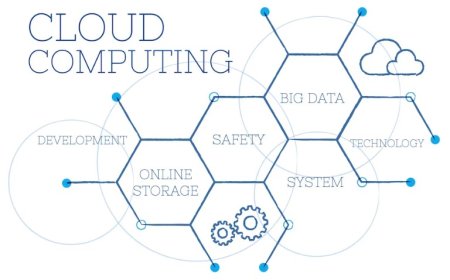The Power of Cloud Computing: Exploring Cloud Computing Tool
Unlock the future of computing with powerful cloud tools. Discover the limitless potential of cloud computing for your business.

In today's digital age, cloud computing has become an indispensable part of our lives. It offers a wide range of benefits, from seamless data access to scalable infrastructure. But have you ever wondered about the tools that make all of this possible? In this blog, we'll explore some popular cloud computing tools in a friendly and accessible manner
Amazon Web Services (AWS)
- Amazon Elastic Compute Cloud (EC2) is a flexible and scalable cloud computing service provided by Amazon Web Services (AWS).
- With EC2, you can quickly and easily provision virtual servers, known as instances, in the cloud.
- EC2 instances are highly customizable, allowing you to choose the operating system, memory, CPU, storage, and networking capabilities that best suit your needs.
- You have full control over your instances, including the ability to start, stop, terminate, and reboot them at any time.
- EC2 offers a wide range of instance types optimized for various use cases, such as general-purpose computing, memory-intensive applications, or GPU-intensive workloads.
- Scaling your infrastructure is a breeze with EC2. You can increase or decrease the number of instances based on demand, ensuring that your application always has the necessary resources.
- EC2 integrates seamlessly with other AWS services, allowing you to easily build complex and scalable architectures. For example, you can use EC2 instances in conjunction with Amazon S3 for storage or Amazon RDS for managed databases.
- EC2 provides robust security features, including built-in firewalls, encrypted data storage, and secure access controls, to keep your instances and data safe.
- Pricing for EC2 is flexible and based on the resources you consume. You only pay for what you use, with no upfront costs or long-term commitments.
- EC2 is widely used by businesses of all sizes, from startups to large enterprises, to power a wide range of applications, from simple websites to complex big data analytics platforms.
Amazon Elastic Compute Cloud (EC2)
- Amazon Elastic Compute Cloud (EC2) is a highly flexible and scalable cloud computing service offered by Amazon Web Services (AWS).
- With EC2, you can quickly provision virtual servers, known as instances, and easily scale the number of instances up or down based on your needs.
- EC2 provides a wide variety of instance types, allowing you to choose the optimal combination of computing power, memory, storage, and networking capacity for your applications.
- You have full control over your instances, including the ability to select your operating system, install applications, and manage your virtual machine configurations.
- EC2 offers a pay-as-you-go pricing model, where you only pay for the resources you actually use, helping you save costs and optimize your budget.
- EC2 provides a reliable and secure infrastructure, with built-in features such as security groups, encryption options, and regular data backups to ensure the safety of your applications and data.
- It integrates seamlessly with other AWS services, enabling you to easily combine EC2 with services like Amazon S3 for storage, Amazon RDS for databases, and Amazon VPC for networking.
- EC2 offers global availability, with multiple regions and Availability Zones, allowing you to deploy your applications closer to your users and ensure high availability and low latency.
- You can automate and manage your EC2 instances using AWS management tools, such as the AWS Management Console, AWS CLI (Command Line Interface), or SDKs (Software Development Kits) for different programming languages.
- EC2 is a popular choice for a wide range of use cases, from hosting websites and web applications to running complex big data processing tasks or machine learning workloads.
Amazon Simple Storage Service (S3)
- Amazon Simple Storage Service (S3) is a super handy storage solution provided by Amazon Web Services (AWS).
- It's like having your own virtual storage warehouse where you can securely store and retrieve any amount of data from anywhere in the world.
- S3 is designed to be highly scalable, meaning it can handle large volumes of data without breaking a sweat.
- It offers a simple and intuitive interface, making it easy to upload, manage, and organize your files and folders.
- You can choose from various storage classes based on your needs, whether you want frequent access, long-term storage, or a combination of both.
- S3 provides robust security features, including encryption, access controls, and data replication, to keep your data safe and protected.
- It integrates seamlessly with other AWS services, allowing you to leverage its storage capabilities in conjunction with other powerful tools and services.
- S3 is widely used by individuals, small businesses, and large enterprises for a wide range of applications, such as backup and restore, content distribution, data archiving, and much more.
- With its pay-as-you-go pricing model, you only pay for the storage you use, making it cost-effective and flexible for businesses of all sizes.
- Whether you're a developer, a business owner, or just someone looking for a reliable and scalable storage solution, Amazon S3 has got you covered!
Amazon Relational Database Service (RDS)
- Amazon Relational Database Service (RDS) is like having your own personal database wizard that takes care of all the behind-the-scenes work for you.
- With RDS, you don't have to worry about setting up, managing, and scaling your own database infrastructure. Amazon handles all of that for you.
- RDS supports popular relational database engines like MySQL, PostgreSQL, Oracle, and SQL Server, so you can choose the one that best fits your needs.
- You can easily launch a new database instance with just a few clicks, and RDS will handle all the heavy lifting, including automatic backups and software patching.
- RDS provides high availability and durability, with automated backups and the ability to replicate your database to different availability zones for added resilience.
- Scaling your database is a breeze with RDS. You can easily increase or decrease the compute and storage capacity of your database instance to match your application's needs.
- RDS offers monitoring and logging features, so you can keep an eye on the performance of your database and troubleshoot any issues that may arise.
- Security is a top priority with RDS. It provides built-in encryption, authentication, and access control features to keep your data safe.
- RDS integrates seamlessly with other AWS services, allowing you to leverage the power of the entire AWS ecosystem in your applications.
- With RDS, you can focus on building your application and let Amazon take care of the database management, giving you more time to innovate and deliver value to your customers.
Microsoft Azure
Azure Virtual Machines offer scalable computing power in the cloud. Users can quickly provision VMs with various operating systems and applications, giving them the flexibility to run their workloads efficiently. With Azure VMs, businesses can scale their infrastructure based on demand, reducing costs and enhancing performance.
Azure Storage provides secure and scalable cloud storage solutions. It offers options for storing and retrieving various types of data, including blobs, files, tables, and queues. Azure Storage ensures high availability, durability, and low latency, making it ideal for a wide range of use cases, from backup and restore to content delivery and archival.
Azure SQL Database is a fully managed, intelligent relational database service. It offers high performance, scalability, and built-in AI capabilities for data-driven applications. With Azure SQL Database, businesses can focus on their applications while Azure handles critical database management tasks, such as backups, patching, and security.
Google Cloud Platform (GCP)
- Flexible and Scalable: GCP offers a wide range of services that can be easily tailored to meet your specific needs, whether you're a small startup or a large enterprise. It scales seamlessly as your business grows.
- Reliable Infrastructure: With Google's extensive global network of data centers, GCP ensures high availability and reliability for your applications and data. You can trust that your services will be up and running when you need them.
- Cutting-Edge Technology: GCP is built on innovative technologies that empower you to leverage machine learning, artificial intelligence, big data analytics, and more. Stay ahead of the curve and unlock the potential of advanced technologies.
- Developer-Friendly: GCP provides a robust set of development tools and APIs, making it easy for developers to build, test, and deploy applications. The platform supports multiple programming languages and integrates well with popular development frameworks.
- Cost-Effective: GCP offers competitive pricing options and flexible payment models, allowing you to optimize costs based on your usage. You can scale resources up or down as needed, ensuring you only pay for what you use.
- Security and Compliance: Google's industry-leading security measures and compliance certifications ensure the protection of your data. GCP provides built-in security features and tools to help you meet regulatory requirements.
- Comprehensive Services: From compute and storage to networking, databases, and AI services, GCP offers a comprehensive suite of services to meet all your cloud computing needs. You can mix and match services to create a customized solution.
- Vibrant Community: Join a thriving community of developers, experts, and enthusiasts who actively contribute to GCP's ecosystem. Benefit from their knowledge, share experiences, and collaborate on innovative projects.
- Global Reach: GCP's extensive global network allows you to deploy your applications and services closer to your users, reducing latency and improving performance worldwide.
- 24/7 Support: GCP provides 24/7 customer support to help you with any issues or questions you may have. Their support team is responsive, knowledgeable, and dedicated to ensuring your success on the platform.
Docker
Docker is a popular tool used for containerization, which allows applications to run in isolated environments called containers. With Docker, developers can package their applications along with their dependencies into portable containers. This simplifies application deployment and management, making it easier to run applications consistently across different environments.
Kubernetes
Kubernetes, often referred to as K8s, is an open-source container orchestration platform. It simplifies the management of containerized applications at scale. Kubernetes automates tasks like deployment, scaling, and load balancing, ensuring efficient resource utilization and high availability of applications.
Ansible
Ansible is a powerful automation tool used for configuration management and orchestration. It allows users to define and deploy infrastructure as code, making it easier to manage and scale cloud resources. With Ansible, tasks such as provisioning virtual machines, configuring network settings, and deploying applications can be automated, saving time and effort.
Salesforce
Salesforce is a cloud-based customer relationship management (CRM) platform that helps businesses manage their sales, marketing, and customer service operations. It offers a range of tools and features, including lead management, email marketing, and analytics, all accessible through a user-friendly interface. With Salesforce, businesses can streamline their customer interactions and drive growth.
Slack
Channels are at the heart of Slack. They serve as dedicated spaces for team discussions, allowing members to communicate openly and share information. Channels can be organized by project, department, or topic, making it easy to keep conversations focused and accessible to the right people.
Slack enables users to send direct messages to individuals or create private group chats for focused discussions. This feature is particularly useful for one-on-one conversations, sharing sensitive information, or collaborating with a select group of team members.
File Sharing: With Slack, sharing files becomes a breeze. Users can upload and share documents, images, videos, and other files directly within the platform. This eliminates the need for separate email threads or file sharing services, ensuring that everyone has access to the latest versions of shared files.
Dropbox
Dropbox is a cloud storage and file synchronization service that enables users to store and share files securely. It offers features such as file versioning, collaboration tools, and easy access from multiple devices. With Dropbox, users can collaborate on documents, share files with others, and access their data from anywhere, eliminating the need for physical storage devices.
Adobe Creative Cloud
Adobe Creative Cloud is a suite of cloud-based creative tools for graphic design, video editing, photography, and more. It includes popular applications like Photoshop, Illustrator, Premiere Pro, and Lightroom, all accessible through a subscription model. With Creative Cloud, designers and creative professionals can unleash their creativity, collaborate on projects, and access their work across different devices.
These cloud computing tools have transformed the way businesses operate, collaborate, and innovate. They provide accessibility, scalability, and efficiency, enabling organizations of all sizes to leverage the power of the cloud. Whether you're managing customer relationships, collaborating with colleagues, or creating stunning visual content, these tools offer the functionality and flexibility to drive success.
As the world of technology continues to evolve, new cloud computing tools will emerge, offering even more possibilities and capabilities. Embracing these tools and staying updated with the latest advancements in cloud technology will empower businesses to thrive in the digital age.
In conclusion, cloud computing tools have transformed the way businesses operate in today's digital landscape. With offerings from Amazon Web Services (AWS), Microsoft Azure, and Google Cloud Platform (GCP), organizations have access to a wide array of services and resources to meet their specific needs. These tools provide scalable and flexible infrastructure, robust storage solutions, advanced data analytics capabilities, and AI and machine learning services. They empower businesses to innovate, reduce costs, increase efficiency, and enhance collaboration. Whether it's hosting applications, storing data, analyzing big data, or deploying machine learning models, cloud computing tools offer a comprehensive suite of services to drive success. By leveraging these tools, businesses can focus on their core competencies while leaving the management of infrastructure and resources to the cloud providers. As technology continues to evolve, cloud computing tools will undoubtedly play a pivotal role in shaping the future of business operations.































































